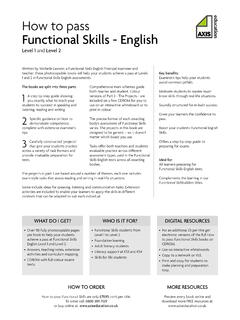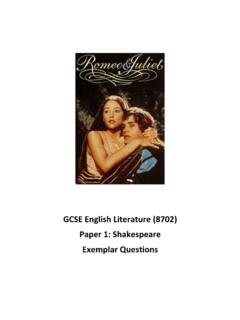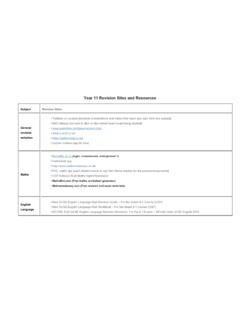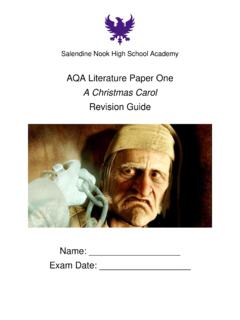Transcription of ‘A TASTE OF HONEY’- REVISION GUIDE Shelagh Delaney
1 1 A TASTE OF HONEY - REVISION GUIDE Shelagh Delaney Shelagh Delaney was born November 25, 1939, in Salford, Lancashire, England. Her father, a bus inspector , and her mother were part of the English working class, the social group that informs of her writing. Delaney attended Broughton Secondary School but began writing even before she completed her education. She had no further interest in formal education, and after she left school, she held a number of jobs, including salesgirl, usherette, and clerk. The play A TASTE of Honey was produced when Delaney was eighteen-years-old. Although this play was originally being written as a novel, it was rewritten as a play in response to Delaney s dissatisfaction with contemporary theatre.
2 Delaney felt that she could write a better play, with more realistic dialogue, than the plays that were currently being staged. A TASTE of Honey became an unexpected hit, winning several awards both as a play and later as a Delaney s play opened to mixed reviews. In many cases, her characters were praised for their honest, realistic voices. The play was also singled out for its accurate depictions of working class lives. Delaney believed in social protest and has not been afraid to speak out on the need for a more realistic theatre, one that depicts the working class environment of many British citizens. Theatre of the Absurd/ Social Drama During the 1950s/ 1960s two types of theatre emerged- absurd and social drama.
3 The term absurd was supposed to describe life as meaningless and this was a reaction to the mainstream post war theatre about the upper classes. Social drama is often concerned with the working classes and the younger generation. The fact that Delaney chooses a female protagonist who has a homosexual friend and interracial relationship was very controversial at the time. Angry Young Men Angry Young Men was the label given to a group of British writers notably playwright John Osborne of the late-1950s, whose work expressed bitterness and disillusionment with Postwar English society. 2 A common feature of their work is the antihero, a flawed, often abrasive character who rebels against a corrupt social order and strives for personal integrity.
4 Delaney did not set out to become a part of this group, but when her play was produced, many critics saw her work as a protest against working class poverty and the social conditions of her time Kitchen sink theatre Kitchen sink theatre is a movement in theatre which uses family and domestic settings in order to examine social and class issues. A TASTE of Honey is referred to as a Kitchen sink drama because it portrays the lives of working class people, living in a deprived inner city environment, struggling to overcome practical and personal problems. 1950s/1960s Culture Changes to culture in society began around 1950 (what we know as the 60s really began around 1955).After the difficulties of rationing and shortages, Britain enjoyed an economic boom in the 'never had it so good' years of the second half of the 50s.
5 The good times continued into the sixties and a social revolution took place. There was a huge emphasis on youth and youth culture Politics Politically, people started to move away from conservatives in favour of the political left as the Country felt cheated and duped by the Suez Crisis. For the first time since the war, people started to mistrust the Government and radical views gained more power. CND movement ( ban the bomb)- 1958 Morality in late 50s/ early 60s Cult of youth- recognition of the teenager in consumerism. Young people suddenly had more power. Fashion and music became really important. Contraception became readily available in the 1960s. Rise and influence of the television. The Wolfenden report 1957- recommended that homosexuality should not be a criminal offence- indicates the change in public opinion 3 ACT 1 SCENE 1 We see the situation that Helen and Jo find themselves in impoverished, helpless and hopeless.
6 We get a first impression of the relationship between the characters: Helen and Jo are constantly arguing. Jo feels that she has the potential to make more of herself than Helen has. Helen seems not to care what happens to Jo. There is, though, a hint of pride in Helen s recognition of Jo s artistic efforts. Jo calls her mother Helen very unusual in the 1950s. Jo is fully aware of her mother s status as a semi-whore . We hear about Helen s rootless life, constantly on the move, often hiding from somebody. We see that Jo has higher standards than her mother, in spite of being brought up by her. Peter puts in an appearance a brash, boorish hanger-on of Helen s.
7 Peter is sexually demanding but Helen seems uninterested. He even offers to marry her, but we find it hard to take the gesture seriously The scene ends, though, with Helen apparently considering it. Jo is afraid of the dark but only inside the house. Begins plot Helen and Jo have just moved in to this flat but already Peter is suggesting yet another move. Jo is nearing the end of her schooling and beginning to think of her future. Introduces key characters Helen, the semi-whore , is clearly unable to organise her own life in a satisfactory way. Jo despises much of her mother s attitude to life. The two women squabble constantly, refuse to help each other and score points off each other.
8 Their relationship seems more like that of peers rather than mother and daughter. This is emphasised by Jo addressing her mother by her first name all the time. Peter is arrogantly confident that Helen will accept him. He is openly hostile to Jo, whom he sees as a barrier to his enjoyment of Helen s company. Jo seems to resent Peter s arrival. Establishes central themes and issues Peter s presence emphasises the complexity of the relationship between mother and daughter. On the face of it there is little affection between the women, and yet Jo seems jealous of Peter. 4 Helen s poverty is partly due to her own lack of ambition, will-power and sense of her own worth. It is clear, though, that she finds herself in this situation partly because of the role of women in 1950s society: they are dependant upon men.
9 Poverty and a lack of decent living conditions are commonplace. Act 1 Scene 2 Introduces a new character The Boy will play a crucial role in the plot by fathering Jo s baby. Develops the plot The Boy proposes to Jo, although they haven t known each other for very long. Jo s acceptance of the proposal is casual. She assures the Boy that Helen will not be prejudiced against him because of his colour. She is as excited about his toy car as she is about the ring. We learn about Helen s husband, and the fact that he wasn t Jo s father. Helen reveals her decision to marry Peter. Jo is opposed, apparently because Helen is ten years older than Peter. Jo is leaving school and has found herself a part-time job.
10 Helen proposes leaving Jo in the flat when she moves in with Peter. Develops the key characters Peter makes the mistake of trying to tell Jo what to do. She attacks him, half-laughing, half-crying . Jo s hostility to Peter is partly because of his attitude to her, but also because of her opposition to the marriage. She is suspicious of him and accuses him of being a womaniser. He doesn t deny it. Peter flirts a little with Jo and gives her a cigarette, perhaps as a peace offering. The Boy quotes Othello , significant in view of the inter-racial relationship. On her own wedding day, Helen is violently opposed to Jo s engagement. Jo is remarkably calm about the likelihood that the Boy will not come back to her after his six-month tour of duty.
















